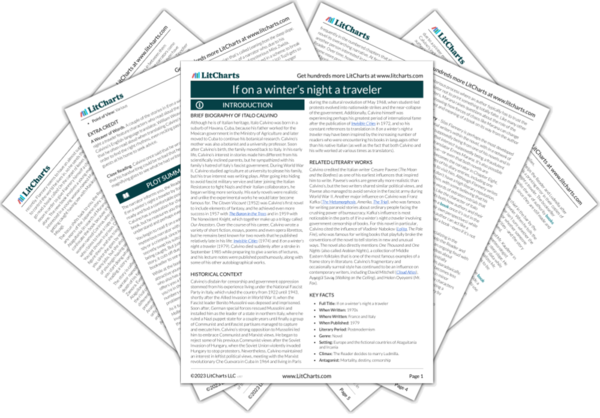Silas Flannery Quotes in If on a winter’s night a traveler
Ermes Marana appears to you as a serpent who injects his malice into the paradise of reading.
This quote describes the Reader’s reaction to first hearing about Ermes Marana, a translator whom the Reader learns about in the publishing house he visits and who seems to have an unusual life full of conspiracy and mystery. Marana has a reputation as a counterfeiter, claiming to translate books but in fact replacing them with translations of totally unrelated books. While the Reader seems to be interested in Marana, unable to stop reading his letters, ultimately the Reader finds Marana disturbing.
By raising the idea that a translation could be an unfaithful copy of the original, Marana destroys the Reader’s notion of a book as an act of communication between an author and a reader. Although Marana represents an extreme case, he illustrates how in general, translation can be a tricky job, and even a faithful translator may nevertheless introduce some changes into a book. By refusing to remain ignorant about the book-making process, the Reader, like Ludmilla, finds himself falling down a rabbit hole of questions that make him doubt everything he knows about reading. This reinforces the novel’s broader argument about how the truth can be elusive and fragmented.
The Koran is the holy book about whose compositional process we know most. There were at least two mediations between the whole and the book: Mohammed listened to the word of Allah and dictated, in his turn, to his scribes. Once—the biographers of the Prophet tell us— while dictating to the scribe Abdullah, Mohammed left a sentence half finished. The scribe, instinctively, suggested the conclusion. Absently, the Prophet accepted as the divine word what Abdullah had said. This scandalized the scribe, who abandoned the Prophet and lost his faith.
He was wrong… The scribe’s collaboration was necessary to Allah, once he had decided to express himself in a written text.
I have had the idea of writing a novel composed only of beginnings of novels. The protagonist could be a Reader who is continually interrupted. The Reader buys the new novel A by the author Z. But it is a defective copy, he can’t go beyond the beginning.

Silas Flannery Quotes in If on a winter’s night a traveler
Ermes Marana appears to you as a serpent who injects his malice into the paradise of reading.
This quote describes the Reader’s reaction to first hearing about Ermes Marana, a translator whom the Reader learns about in the publishing house he visits and who seems to have an unusual life full of conspiracy and mystery. Marana has a reputation as a counterfeiter, claiming to translate books but in fact replacing them with translations of totally unrelated books. While the Reader seems to be interested in Marana, unable to stop reading his letters, ultimately the Reader finds Marana disturbing.
By raising the idea that a translation could be an unfaithful copy of the original, Marana destroys the Reader’s notion of a book as an act of communication between an author and a reader. Although Marana represents an extreme case, he illustrates how in general, translation can be a tricky job, and even a faithful translator may nevertheless introduce some changes into a book. By refusing to remain ignorant about the book-making process, the Reader, like Ludmilla, finds himself falling down a rabbit hole of questions that make him doubt everything he knows about reading. This reinforces the novel’s broader argument about how the truth can be elusive and fragmented.
The Koran is the holy book about whose compositional process we know most. There were at least two mediations between the whole and the book: Mohammed listened to the word of Allah and dictated, in his turn, to his scribes. Once—the biographers of the Prophet tell us— while dictating to the scribe Abdullah, Mohammed left a sentence half finished. The scribe, instinctively, suggested the conclusion. Absently, the Prophet accepted as the divine word what Abdullah had said. This scandalized the scribe, who abandoned the Prophet and lost his faith.
He was wrong… The scribe’s collaboration was necessary to Allah, once he had decided to express himself in a written text.
I have had the idea of writing a novel composed only of beginnings of novels. The protagonist could be a Reader who is continually interrupted. The Reader buys the new novel A by the author Z. But it is a defective copy, he can’t go beyond the beginning.









